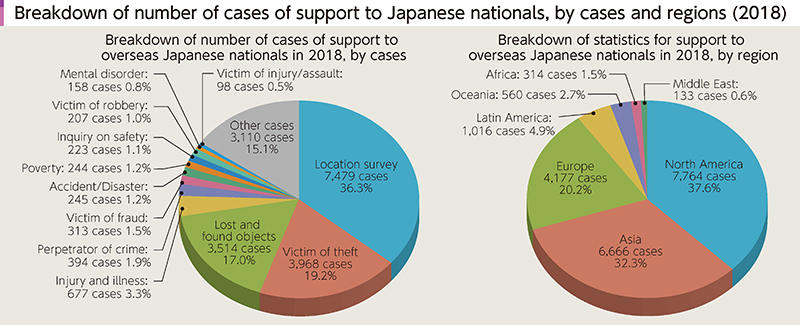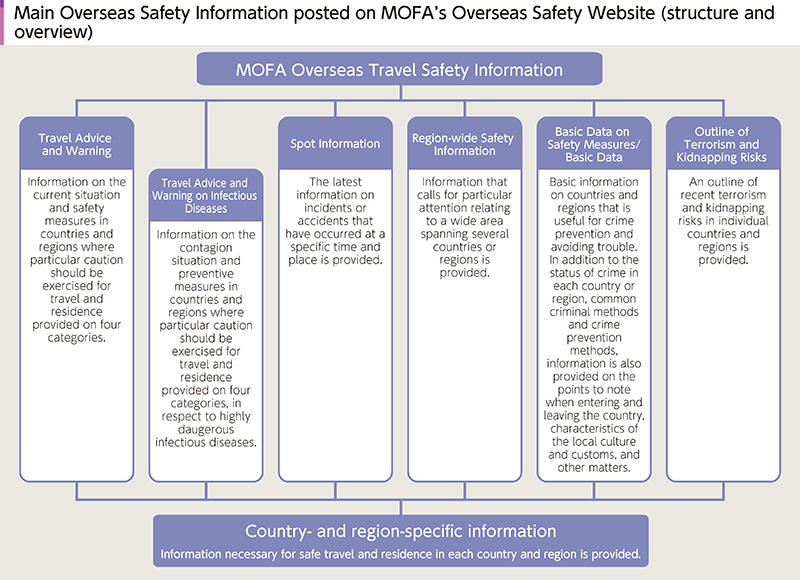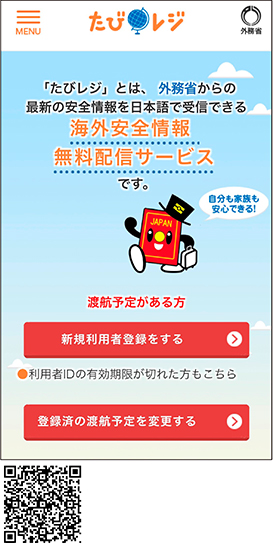Diplomatic Bluebook 2020
Chapter 4
Japan's Diplomacy Open to the Public
Section 2 Supporting Japanese Nationals Overseas
1 Risks and Safety of Japanese Nationals Overseas
(1) Incidents and Accidents in 2019 and Countermeasures
19 million Japanese nationals traveled abroad in 20181, and 1.39 million Japanese nationals live abroad as of October 2018. Hence, protecting the lives and health of Japanese nationals traveling and residing abroad, as well as promoting their interests, is one of the most important missions of MOFA.
In 2019, one Japanese national was killed in the simultaneous terrorist bombings in Sri Lanka (April) and the shooting incident in Afghanistan (December) respectively. Other incidents also occurred throughout the year, including the hotel attack in Nairobi, Kenya (January), the terrorist shooting at mosques in Christchurch, New Zealand (March), the suicide bombing in Tunis, Tunisia (June), consecutive bombings in Bangkok, Thailand (August), explosions in central Cairo, Egypt (October), the attack at the Jerash Ruins, Jordan (November), and the knife attack on London Bridge, the UK (November).
The recent trend of terrorist attacks includes terrorism happening not only in the Middle East and Africa but also in Europe, the U.S. and Asia where many Japanese travel and reside. Both homegrown terrorism perpetrated by people born in Western countries and indoctrinated through websites or other means by foreign Islamic extremists, and lone-wolf terrorism perpetrated by people acting solely with little organizational background are found in tremendous numbers. Additionally, terrorist attacks aimed at soft targets where large numbers of the general public gather every day are on the rise.
This trend has not changed despite the fact that the Islamic State in Iraq and the Levant (ISIL), which has been urging terror attacks outside its region, is losing its territory in Syria and Iraq. In addition, foreign fighters of ISIL are now returning to their home countries or moving to third countries. These factors make it more difficult to predict and prevent terror attacks.
Other major incidents and accidents involving the death of Japanese nationals overseas included gun killings in North America and Latin America, and killings with lethal weapons in Southeast Asia. There was also an incident of death by drowning in the Pacific region, as well as accidents in North America, South America, and Southwest Asia, such as falling and slipping when sightseeing or trekking. Deaths caused by accidents such as traffic accidents also occurred in various parts of the world.
Many natural disasters also occurred around the world and caused great damage. These include cyclones “Idai” (March) and “Fani” (May), hurricane “Dorian” (August), and the volcanic eruption on White Island, New Zealand (December).
In 2019, large-scale protests were held successively in Hong Kong and other parts of the world, resulting in MOFA's call on Japanese nationals through its Overseas Safety Website and other channels to avoid going near demonstrations and protests. Corresponding to the regional situation, MOFA also published overseas travel safety information especially when special caution was required in traveling and residing overseas. In 2019, the risk level of Venezuela, Sudan, Hong Kong, and Bolivia, was raised, among others.
As was the case in the previous year, there were continued reports of people falling ill during a trip abroad and dying at the hotels or other accommodations they were staying at. In some of these accidents and illnesses, victims faced difficulties in dealing with higher medical and transportation costs, and receiving insufficient medical services compared to those in Japan.
MOFA issues “Overseas Travel Safety Information” on infectious diseases and air pollution in countries and regions where health and medical caution is required, to inform Japanese nationals overseas of the current outbreak situation and prevention measures, and highlight the matters they need to pay attention to when travelling and staying in the affected regions.
Since 2019, the novel coronavirus disease (COVID-19) outbreak that began in China has been raging across the world (see the boxed article on page 338). As for other infectious diseases, cases of Ebola were reported in the Democratic Republic of the Congo and Uganda, and measles was prevalent in various parts of the world. In addition, cases of the Middle East Respiratory Syndrome (MERS) continue to be reported in the Middle East. Mosquito-borne diseases, including the Zika virus, yellow fever, Dengue fever and malaria, also continued to spread throughout the world.


- 1 Source: Ministry of Justice, “Statistics on Legal Migrants”
Response to the Novel Coronavirus (COVID-19) Outbreak
Ensuring the safety of Japanese nationals residing and travelling overseas is one of the most important responsibilities of the Ministry of Foreign Affairs. Since the end of 2019, MOFA has been responding to the novel coronavirus disease (COVID-19) outbreak that began in China by disseminating information such as Travel Advice and Warning on Infectious Diseases and Spot Safety Information to Japanese nationals abroad and raising their awareness in a timely and appropriate manner through MOFA's website and e-mails.
In Hubei Province, particularly Wuhan City where tight restrictions on movement were imposed due to the large number of infections, MOFA coordinated with the respective parties to assist the early departure of all Japanese nationals who wished to return to Japan but could not due to the movement restrictions. To that end, 10 embassy staff, including a medical officer and Chinese-speaking staff, travelled by road for 17 hours across 1,200 km to Wuhan City, while 19 MOFA officials from Japan also flew to the city to implement the evacuation operation. Their work, along with the support of the Government of China, led to five chartered flights operating from Wuhan Airport to Haneda Airport from the end of January to mid-February, bringing back all Japanese nationals and their families residing in Hubei Province, as well as those residing outside Wuhan City, who wished to return to Japan.
With regard to overseas travel from Japan, MOFA called for caution by issuing Travel Advice and Warning on Infectious Diseases*1 as things developed. On January 21, MOFA issued a Level 1 Travel Advice and Warning on Infectious Diseases (“Exercise caution”) for the whole of China. This was raised to Level 2 (“Avoid non-essential travel”) for Wuhan City on January 23, and Level 3 (“Avoid all travel”) for Hubei Province including Wuhan City on January 24. Taking into consideration the changes in the situation thereafter, MOFA raised the level where necessary and expanded the countries/regions covered. By April 1, it had issued a Level 3 Travel Advice and Warning on Infectious Diseases for 73 countries and regions including China and Europe, and Level 2 for all other countries and regions.
Apart from this, MOFA also issued Level 2 general Travel Advice and Warning*2 worldwide on March 25, with the aim of preventing Japanese nationals from encountering difficulties in leaving other countries due to flight suspensions and measures such as the closing of national borders and curfews imposed by other countries in response to the increase of infections.
At the same time, the Government of Japan is flexibly implementing measures toward strengthening border control measures in cooperation with the relevant ministries and agencies. Corresponding to the Travel Advice and Warning on Infectious Diseases levels issued for each country and region, the suspension of the validity of single-entry and multiple-entry visas and suspension of visa exemptions were implemented for Level 2 countries and regions, and Japanese as well as foreign nationals entering Japan from such countries and regions were requested to undergo a voluntary 14-day self-isolation. For Level 3 countries and regions, PCR tests were conducted for Japanese nationals returning to Japan from these countries and regions as well as members of their families of other nationalities. In addition, based on the provisions of the Immigration Control and Refugee Recognition Act, measures were also taken to deny entry of foreign nationals who had stayed in these regions in the past 14 days.
In light of the importance of international collaboration and cooperation in responding to the outbreak of infectious diseases, Japan announced on March 10 that it will contribute approximately 15 billion yen to international organizations, including the World Health Organization (WHO) and the United Nations Children's Fund (UNICEF), and provide emergency assistance to Iran and surrounding developing countries.
- *1, 2 The Overseas Travel Safety Information issued by MOFA to inform people of the risk level in countries and regions, is categorized as “Travel Advice and Warning on Infectious Diseases” or “Travel Advice and Warning.”
“Travel Advice and Warning on Infectious Diseases” is issued for countries and regions that are deemed to require particular caution for travelers and residents, in respect to highly dangerous infectious diseases including the novel coronavirus disease (COVID-19), while “Travel Advice and Warning” is issued as a guideline for safety measures, based on a comprehensive assessment of the country's political and social situation, such as internal disturbances and terrorism.
Both categories of information are presented based on the following four categories.
Level 1: Exercise caution
Level 2: Avoid non-essential travel
Level 3: Avoid all travel
Level 4: Evacuate and avoid all travel
<Tips for Traveling and Living Abroad>
As described above, incidents which threaten the safety of Japanese nationals have constantly occurred all around the world. In addition to registering with the Overseas Travel Registration (Tabi-Regi) or submission of Overseas Residential Registration, important measures for Japanese nationals traveling and living abroad include: (1) thoroughly checking security and other information through the Overseas Safety Website, media reports and other sources beforehand; (2) taking adequate safety measures during their stay to avoid risks; and (3) contacting the nearest Japanese diplomatic missions overseas and family in Japan in case of emergency. MOFA also conveys the importance of taking out travel insurance with a sufficient coverage when traveling abroad since the lack of travel insurance will make it difficult to pay medical expenses or to receive proper medical care in case of diseases and accident injuries.

(2) Safety Measures for Japanese Nationals Overseas
The number incidents of Japanese nationals receiving support or protection from Japanese diplomatic missions overseas and the Japan-Taiwan Exchange Association has stayed at a high level. In 2018, there were 22,349 by number of persons and 20,630 by number of cases.2
In order to avoid accidents and troubles overseas, it is important to collect information beforehand. As such, MOFA works to enhance the safety awareness of Japanese nationals and promote its safety measures by disseminating information widely to the general public.
MOFA issues the latest safety information for each country and region on the Overseas Safety Website, and emails the latest safety information of travel destinations and places of residence to Japanese nationals staying overseas with Overseas Residential Registrations and short-term travelers who have registered with the Tabi-Regi. Tabi-Regi is also available to those without travel plans through simple registration. The distributed safety information is widely utilized by Japanese business persons in charge of foreign operations. Since Tabi-Regi was launched in July 2014, MOFA has improved its user-friendliness and sponsored many activities to increase the number of registrants. Currently, the cumulative total registration is more than 6.5 million.
 MOFA Overseas Travel Registration (Tabi-Regi) (only in the Japanese language)
MOFA Overseas Travel Registration (Tabi-Regi) (only in the Japanese language)https://www.ezairyu.mofa.go.jp/tabireg/index.html
 MOFA Overseas Safety App/Overseas safety website “About the Overseas Safety App Services” can be downloaded from (https://www.anzen.mofa.go.jp/c_info/oshirase_kaian_app.html) (only in the Japanese language)
MOFA Overseas Safety App/Overseas safety website “About the Overseas Safety App Services” can be downloaded from (https://www.anzen.mofa.go.jp/c_info/oshirase_kaian_app.html) (only in the Japanese language)MOFA strives to enhance the knowledge and capability of the Japanese people concerning overseas safety measures and crisis management through seminars and trainings. MOFA has hosted participatory safety measure seminars in and out of Japan, and dispatched lecturers from the Consular Affairs Bureau to deliver lectures on safety measures at seminars nationwide, organized by other organizations and associations (around 80 times in 2019). MOFA also hosted the Public-Private Joint Practical Training for Counter-Terrorism and Anti-Kidnapping Measures with participation from private companies. These efforts are beneficial not only for taking preventive measures against dangers like crime and terrorism, but also for enhancing response capabilities in case of emergency.
In addition, overseas, the public and private sectors are also cooperating to advance safety measures. The diplomatic missions in each country host regular meetings of Security Consultation and Liaison Committees with local Japanese nationals to share information, exchange opinions and bolster collaboration in preparation for emergencies.
After the terrorist attack in Dhaka in July 2016, MOFA has worked to enhance the safety measure seminars and strengthen awareness particularly among international cooperation personnel, small- and medium-sized enterprises (SMEs), students studying abroad, short-term travelers and others who have limited access to information on safety.
First, MOFA launched the Small and Medium Enterprise Overseas Safety Measures Network, with the participation of 29 organizations and agencies related to the overseas expansion of Japanese businesses in September 2016, in order to support SMEs, which account for the vast majority of Japanese companies, in their overseas corporate activities in the area of safety measures. At the meeting of the Network in August 2019, a new organization was added, expanding the number of member organizations in the Network to 30. The collaboration among members in this Network has strengthened the safety measures of those companies, such as raising awareness on safety measures overseas through seminars and newsletters in and outside Japan, establishing horizontal relationships among participating companies, and seeking to provide better support services for business. Furthermore, in March 2017, MOFA released Golgo 13's Security Guidelines for Japanese SMEs Abroad, which explains the minimal and basic safety measures for companies in an easy-to-understand manner through manga (comics). After its release, about 120,000 copies per volume have been distributed and the dedicated webpage on MOFA's website has received about 1.7 million views, indicating that the Guidelines have been used by Japanese businesses widely and contributed to raising awareness on overseas safety measures.
As for Japanese students studying overseas, MOFA is working to enhance their awareness of safety measures and aid in the establishment of crisis management systems at schools by sending lecturers to universities and other educational institutions, many of which have insufficient knowhow or experience on safety measures and emergency responses. MOFA is going forward with efforts to connect government agencies with educational institutions, overseas study agencies and students by such means as beginning automatic registration to the Tabi-Regi with some overseas study institutions.
As for safety measures for short-term travelers, MOFA is engaged in PR activities mainly focused on promoting registration to the Tabi-Regi by gaining the cooperation of Japanese airlines to make in-flight announcements.
MOFA also took various opportunities to convey the importance of working on safety measures and to call for traveler's cooperation, such as taking out advertisements in various media outlets, and hosting a booth at Tourism EXPO Japan in 2019, held for the first time in Osaka.
- 2 The Statistics on Assistance for Japanese Involved in Accidents and Other Incidents, first published in 1986, is an annual report on the number of cases/people where the diplomatic missions overseas and the Japan-Taiwan Exchange Association provided assistance to Japanese nationals involved in any kind of troubles overseas, such as incidents/accidents, acts of committing crimes and falling victim to crime or disaster.
